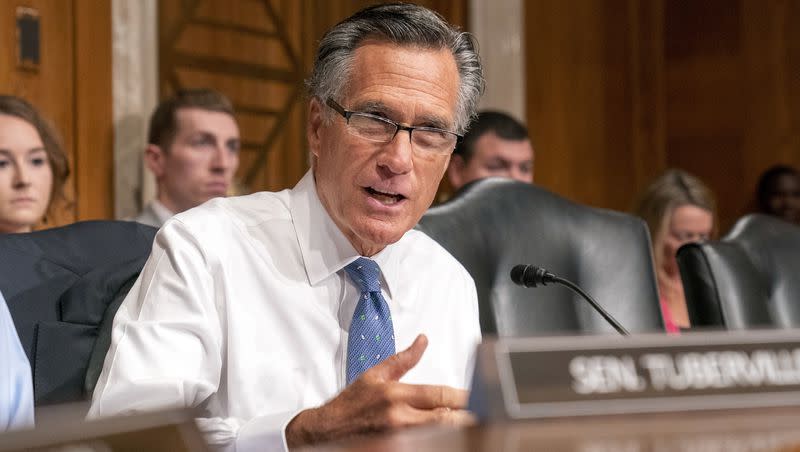Sen. Mitt Romney says he is concerned about a nuclear North Korea

At a Foreign Relations Committee hearing Wednesday on the Korean Peninsula, chaired by Sen. Mitt Romney, the senators discussed the security situation on the Korean Peninsula.
The Utah senator noted the Korean War took place in the early 1950s when the U.S. and the former Soviet Union were in the midst of the Cold War.
“In some respects, we are facing another Cold War today — not with the former Soviet Union so much as with an assertive China,” he said.
But two things are different. First, South Korea, Romney said, has become “an extraordinary technological leader and economic powerhouse.”
The country is a hub for AI startups and robotics adoption and topped the Bloomberg Innovation Index, ranking at least 10 spots higher than the U.S.
Romney said South Korea “has fought well above its weight class in the world of economic affairs and in geopolitics, which is greatly appreciated here and by other nations around the world.”
Second, its neighbor, North Korea, has risen to be “more belligerent and more malevolent” in recent years.
North Korea President Kim Jong Un’s missile testing and potential arms deal with Russia for their invasion of Ukraine have created tension in the Korean Peninsula.
“I’m concerned about the fact that South Korea has a nuclear neighbor to its north with a massive investment in conventional as well as nuclear arms and at the same time does not have a nuclear capacity of its own,” Romney said.
He said he assumed South Koreans were disturbed by the lack of security and sought more stability.
During his testimony, witness Victor Cha, the senior vice president for Asia and Korea at the Center for Strategic and International Studies, made recommendations to smooth tensions in the region. This included taking preemptive action on North Korea’s missile launches, which Romney asked Cha to elaborate on.
“Since last year, North Korea has done over 100 ballistic missile tests,” Cha said. “All of us have been studying this issue for decades, and we’ve never seen that level, that tempo of activity before.”
Cha explained that the tests demonstrate the country’s capabilities to the world while advancing military technology.
“You need to test to know whether it works,” Cha said, adding there isn’t a “good way to deter” the missile testing.
Japan, South Korea and the U.S. have developed integrated missile tracking defense systems that give a warning alert ahead of time but because it's a moving target, additional deterrents need to be put in place, Cha said.
One “risky” idea is a declaratory policy, where the U.S. and its allies can reserve the right to strike down a missile if it heads to Japan or Hawaii, even if the weapon is mid-course or on the launchpad.
“But the idea is that we need to consider something to deter further missile testing and we don’t have anything that’s doing that right now,” he said. “It’s risky. I acknowledge it’s risky, but perhaps we’re at that point now.”
Can the U.S. negotiate with North Korea over nuclear weapons?
Romney asked the witnesses about the relationship the U.S. should have with North Korea, which has gone “from being aggressive and oppositional on one hand, to writing love letters on the other.”
“What might we do to develop a consistent policy approach with regards to the (Democratic People’s Republic of Korea)?” he asked. “Because what we do so far, from what I can tell, hasn’t worked.”
Cha noted that since the 1980s, the era of President Ronald Reagan, the U.S. has been unsuccessful in forging relations with North Korea.
Yet the deal the U.S. has presented to North Korea has stayed the same over the decades: Freeze and dismantle its own nuclear ambitions in exchange for economic assistance, and an assurance of peace in the region.
“But I think we have to come to the realization that’s not the deal that they want anymore,” Cha said. “Frankly, we’re at a loss as to what to pursue next.”
He added that the U.S. isn’t willing to consider North Korea’s demands, like dissolving its alliance with South Korea or removing American troops from the Korean Peninsula and Japan.
Another witness, Scott Snyder, a senior fellow for Korea studies at the Council for Foreign Relations, said that the U.S. has learned something by engaging with the North Korean president at global summits — “Kim Jong Un does not want to give up his nuclear weapons.”
But, as Snyder noted, “even though he thought he was entering into negotiations from a position of strength, he wasn’t nearly powerful enough to coerce us into accepting him as a nuclear state.”

